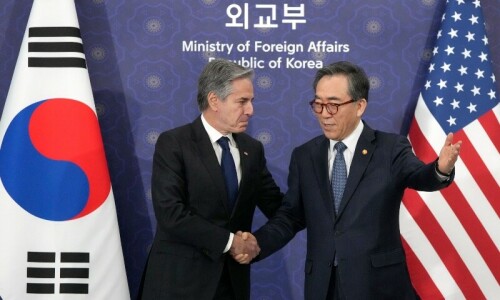TEHRAN, June 3: Iran ruled out halting its disputed nuclear programme on Tuesday, days before world powers were expected to offer trade and other benefits to coax Tehran into stopping atomic work they fear is aimed at making bombs.
Supreme Leader Ayatollah Ali Khamenei, the country’s top authority, said the United States knew it was lying when it accused Iran of seeking to build nuclear weapons.
Such arms were of no use and Tehran opposed them, Khamenei said at an event to mark the anniversary of the death in 1989 of the Islamic Republic’s founder, Ayatollah Ruhollah Khomeini.
“Iran is not after nuclear weapons. It is after peacefully using nuclear energy ... we will follow this path and ... will reach it,” he said in a speech broadcast on state television.
The refusal of Iran, the world’s fourth-largest oil producer, to stop sensitive nuclear work has prompted three rounds of UN sanctions since 2006.
Iran, which has played down the impact of sanctions on its economy, says it only aims to generate electricity so it can export more oil and gas.
“Today no logical person or officials go after nuclear weapons. The Iranian nation opposes these kinds of weapons,” said Khamenei, who succeeded Khomeini as Iran’s supreme leader.
World powers have prepared an enhanced package of trade and other incentives for Iran if it suspends nuclear enrichment, something Tehran has consistently refused to do.
The US State Department said on Monday it expected European Union foreign policy chief Javier Solana to submit the package to Tehran in mid-June.
US BULLYING: Enriched uranium can be used as fuel for power plants or, if refined much further, provide material for bombs.
The International Atomic Energy Agency (IAEA) last week said intelligence reports of secret Iranian research into nuclear warheads was a matter of serious concern and it should provide more information on its missile-related work.
Iran has rejected the intelligence as baseless.
But IAEA chief Mohammed ElBaradei on Monday demanded “full disclosure” from Iran on the intelligence, saying Tehran appeared to be holding back information needed for his investigators to draw conclusions.
Without full transparency, Iran could not expect a clean bill of health, he told a meeting of the IAEA’s 35-nation Board of Governors in Vienna.
Diplomats there said western powers were drafting a statement on Iran for approval by the board to back up the IAEA investigation, but it would not be submitted unless they were sure of consensus backing. Russian support was crucial but remained uncertain, they added.
Addressing a crowd at the shrine where Khomeini is buried near Tehran, Khamenei said nuclear weapons “do not bring a nation any power because it cannot be used”.
He vowed Iran would stand up to US “bullying” and he hit out at the administration of Bush, who last month said letting Iran acquire nuclear weapons would be an “unforgivable betrayal of future generations.”
“The way they talk is like psychos talk. Sometimes they make threats, sometimes they give the order for terror, sometimes they ask for help because they are helpless and sometimes they make accusations,” he said.
“They bang themselves (against the walls) like mad people.”
The five permanent members of the U.N. Security Council — the United States, France, Britain, China and Russia — as well as Germany agreed on their updated offer last month but have yet to present it to Tehran.
Diplomats say it is similar to one in 2006 that was rejected by Iran but that it goes into more depth, particularly on civil nuclear cooperation. That offer included civil nuclear cooperation and wider trade in civil aircraft, energy, high technology and agriculture if Tehran suspended enrichment.—Reuters








































Dear visitor, the comments section is undergoing an overhaul and will return soon.